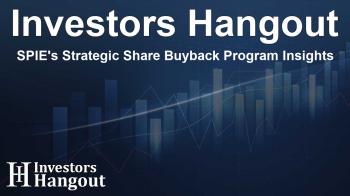SPIE's Strategic Share Buyback Program Insights

Overview of Share Buyback Transactions
In line with current share buyback regulations set forth by authorities, SPIE has disclosed its latest share buyback transactions completed recently under a program authorized by its board. These updates reflect SPIE's commitment to enhance shareholder value through strategic repurchase activities in the market.
Details of Transactions
The aggregate disclosure of SPIE's transactions reveals a streamlined process from the most recent buybacks. The company executed a total of 439,307 shares with a daily weighted average price of €31.4833 over the disclosed period.
Individual Transaction Highlights
On different trading days, SPIE conducted several transactions, focusing on markets like XPAR and CEUX. For instance:
- On January 27, a total of 42,673 shares was acquired for €31.2095 each on the XPAR market.
- The day also saw an additional acquisition of 32,846 shares, priced at €31.2692 on the CEUX market.
These transactions illustrate the diligence with which SPIE manages its capital resources and helps foster an environment of trust among its investors.
Implications of Share Buyback
SPIE's recent buybacks signify its strong market position and proactive approach in optimizing capital allocation. Stock buybacks can indicate confidence in the company’s future performance, and can also serve to enhance earnings per share by reducing the number of outstanding shares in circulation.
About SPIE
Operating as a leading player in multi-technical services across Europe, SPIE is committed to facilitating energy transitions and fostering responsible digital transformations for its extensive clientele. With a robust workforce of 50,000 employees, SPIE remains focused on delivering innovative solutions while maximizing shareholder value.
Financial Performance Highlights
In its most recent financial reporting, SPIE achieved impressive consolidated revenue totaling €8.7 billion along with a consolidated EBITA of €584 million, reflecting a solid operational footing and financial health.
Frequently Asked Questions
What is a share buyback program?
A share buyback program is a strategy where a company repurchases its own shares from shareholders, reducing the number of outstanding shares on the market.
Why does SPIE engage in share buybacks?
SPIE engages in share buybacks to improve shareholder value, signal confidence in its financial health, and to potentially uplift the stock price by reducing supply.
What markets are mentioned in SPIE's share buyback transactions?
The transactions include markets such as XPAR and CEUX, where SPIE conducts its stock buyback activities.
How does a share buyback affect the company's stock price?
Share buybacks can increase a company’s stock price by creating demand for the shares and reducing the overall number available for trading.
What does the financial performance of SPIE look like?
SPIE reported a consolidated revenue of €8.7 billion and EBITA of €584 million, showcasing its strong operational capabilities and market leadership.
About The Author
Contact Kelly Martin privately here. Or send an email with ATTN: Kelly Martin as the subject to contact@investorshangout.com.
About Investors Hangout
Investors Hangout is a leading online stock forum for financial discussion and learning, offering a wide range of free tools and resources. It draws in traders of all levels, who exchange market knowledge, investigate trading tactics, and keep an eye on industry developments in real time. Featuring financial articles, stock message boards, quotes, charts, company profiles, and live news updates. Through cooperative learning and a wealth of informational resources, it helps users from novices creating their first portfolios to experts honing their techniques. Join Investors Hangout today: https://investorshangout.com/
The content of this article is based on factual, publicly available information and does not represent legal, financial, or investment advice. Investors Hangout does not offer financial advice, and the author is not a licensed financial advisor. Consult a qualified advisor before making any financial or investment decisions based on this article. This article should not be considered advice to purchase, sell, or hold any securities or other investments. If any of the material provided here is inaccurate, please contact us for corrections.

